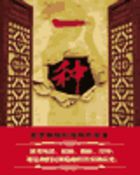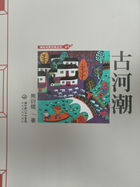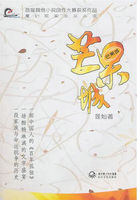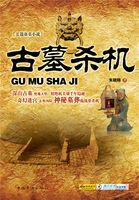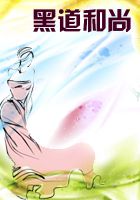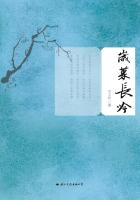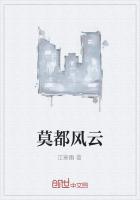One day when, wandering aimlessly about thehouse, he had gone up to the attic, he felt a pellet of fine paper under hisslipper. He opened it and read: “Courage, Emma,courage. I would not bring misery into your life.” Itwas Rodolphe's letter, fallen to the ground between theboxes, where it had remained, and that the wind from the dormer window had justblown towards the door. And Charles stood, motionless and staring, in the verysame place where, long ago, Emma, in despair, and paler even than he, hadthought of dying. At last he discovered a small R at the bottom of the secondpage. What did this mean?He remembered Rodolphe'sattentions, his sudden, disappearance, his constrained air when they had mettwo or three times since. But the respectful tone of the letter deceived him.
“Perhaps they loved one another platonically,”he said to himself.
Besides, Charles was not of those who go tothe bottom of things; he shrank from the proofs, and his vague jealousy waslost in the immensity of his woe. Everyone, he thought, must have adored her;all men assuredly must have coveted her. She seemed but the more beautiful tohim for this; he was seized with a lasting, furious desire for her, thatinflamed his despair, and that was boundless, because it was now unrealisable.
To please her, as if she were still living,he adopted her predilections, her ideas; he bought patent leather boots andtook to wearing white cravats. He put cosmetics on his moustache, and, likeher, signed notes of hand. She corrupted him from beyond the grave.
He was obliged to sell his silver piece bypiece; next he sold the drawing-room furniture. All the rooms were stripped;but the bedroom, her own room, remained as before. After his dinner Charleswent up there. He pushed the round table in front of the fire, and drew up herarmchair. He sat down opposite it. A candle burnt in one of the giltcandlesticks. Berthe by his side was painting prints.
He suffered, poor man, at seeing her so badlydressed, with laceless boots, and the arm-holes of her pinafore tom down to thehips; for the charwoman took no care of her. But she was so sweet, so pretty,and her little head bent forward so gracefully, letting the dear fair hair fallover her rosy cheeks, that an infinite joy came upon him, a happiness mingledwith bitterness, like those ill-made wines that taste of resin. He mended hertoys, made her puppets from cardboard, or sewed up half-tom dolls. Then, if hiseyes fell upon the workbox, a ribbon lying about, or even a pin left in a crackof the table, he began to dream, and looked so sad that she became as sad ashe.
No one now came to see them, for Justin hadrun away to Rouen, where he was a grocer's assistant,and the druggist's children saw less and less of thechild, Monsieur Homais not caring, seeing the difference of their socialposition, to continue the intimacy.
The blind man, whom he had not been able tocur6 with the pomade, had gone back to the hill of Bois-Guillaume, where hetold the travellers of the vain attempt of the druggist, to such an extent,that Homais when he went to town hid himself behind the curtains of the “Hirondelle” to avoid meeting him. Hedetested him, and wishing, in the interests of his own reputation, to get ridof him at all costs, he directed against him a secret battery, that betrayedthe depth of his intellect and the baseness of his vanity. Thus, for sixconsecutive months, one could read in the Fanal de Rouen editorials such asthese:
“All who bend their steps towards the fertileplains of Picardy have, no doubt, remarked, by the Bois-Guillaume hill, awretch suffering from a horrible facial wound. He importunes, persecutes one,and levies a regular tax on all travellers. Are we still living in themonstrous times of the Middle Ages, when vagabonds were permitted to display inour public places leprosy and scrofulas they had brought back from theCrusades?”
Or-
“In spite of the laws against vagabondage,the approaches to our great towns continue to be infected by bands of beggars.Some are seen going about alone, and these are not, perhaps, the leastdangerous. What are our ediles about?”
Then Homais invented anecdotes:
“Yesterday, by the Bois-Guillaume hill, askittish horse-” And then followed the story of anaccident caused by the presence of the blind man.
He managed so well that the fellow was lockedup. But he was released. He began again, and Homais began again. It was astruggle. Homais won it, for his foe was condemned to life-long confinement inan asylum.
This success emboldened him, and henceforththere was no longer a dog run over, a barn burnt down, a woman beaten in theparish, of which he did not immediately inform the public, guided always by thelove of progress and the hate of priests. He instituted comparisons between theelementary and clerical schools to the detriment of the latter; called to mindthe massacre of St. Bartholomew à propos of a grant ofone hundred francs to the church, and denounced abuses, aired new views. Thatwas his phrase. Homais was digging and delving; he was becoming dangerous.
However, he was stifling in the narrow limitsof journalism, and soon a book, a work was necessary to him. Then he composedGeneral Statistics of the Canton of Yonville, followed by ClimatologicalRemarks. The statistics drove him to philosophy. He busied himself with greatquestions: the social problem, moralisation of the poorer classes,pisciculture, caoutchouc, railways, etc. He even began to blush at being abourgeois. He affected the artistic style, he smoked. He bought two chicPompadour statuettes to adorn his drawing——room.
He by no means gave up his shop. On thecontrary, he kept well abreast of new discoveries. He followed the greatmovement of chocolates; he was the first to introduce “cocoa” and “revalenta”into the Seine——Infrrieure. He was enthusiastic about the hydro——electricPulvermacher chains; he wore one himself, and when at night he took off hisflannel vest, Madame Homais stood quite dazzled before the golden spiralbeneath which he was hidden, and felt her ardour redouble for this man morebandaged than a Scythian, and splendid as one of the Magi.
He had fine ideas about Emma's tomb. First he proposed a broken column with some drapery, next apyramid, then a Temple of Vesta, a sort of rotunda, or else a “mass of ruins.” And in all his plans Homaisalways stuck to the weeping willow, which he looked upon as the indispensablesymbol of sorrow.
Charles and he made a journey to Rouentogether to look at some tombs at a funeral fumisher's,accompanied by an artist, one Vaufrylard, a friend of Bridoux's, who made puns all the time. At last, after having examined somehundred designs, having ordered an estimate and made another journey to Rouen,Charles decided in favour of a mausoleum, which on the two principal sides wasto have a “spirit bearing an extinguished torch.”
As to the inion, Homais could think ofnothing so fine as Sta viator, and he got no further; he racked his brain, heconstantly repeated Sta viator. At last he hit upon arnabilen conjugem calcas,which was adopted.
A strange thing was that Bovary, whilecontinually thinking of Emma, was forgetting her. He grew desperate as he feltthis image fading from his memory in spite of all efforts to retain it. Yetevery night he dreamt of her; it was always the same dream. He drew near her,but when he was about to clasp her she fell into decay in his arms.
For a week he was seen going to church in theevening. Monsieur Bournisien even paid him two or three visits, then gave himup. Moreover, the old fellow was growing intolerant, fanatic, said Homais. Hethundered against the spirit of the age, and never failed, every other week, inhis sermon, to recount the death agony of Voltaire, who died devouring hisexcrements, as everyone knows.
In spite of the economy with which Bovarylived, he was far from being able to pay off his old debts. Lheureux refused torenew any more bills. A distraint became imminent. Then he appealed to hismother, who consented to let him take a mortgage on her property, but with agreat many recriminations against Emma; and in return for her sacrifice sheasked for a shawl that had escaped the depredations of Frlicitr. Charlesrefused to give it her; they quarrelled.
She made the first overtures ofreconciliation by offering to have the little girl, who could help her in thehouse, to live with her. Charles consented to this, but when the time forparting came, all his courage failed him. Then there was a final, completerupture.
As his affections vanished, he clung moreclosely to the love of his child. She made him anxious, however, for shecoughed sometimes, and had red spots on her cheeks.
Opposite his house, flourishing and merry,was the family of the chemist, with whom everything was prospering. Napolronhelped him in the laboratory, Athalie embroidered him a skullcap, Irma cut outrounds of paper to cover the preserves, and Franklin recited Pythagoras' table in a breath. He was the happiest of fathers, the mostfortunate of men.
Not so! A secret ambition devoured him.Homais hankered after the cross of the Legion of Honour. He had plenty ofclaims to it.
“First, having at the time of the choleradistinguished myself by a boundless devotion; second, by having published, atmy expense, various works of public utility, such as”(and he recalled his pamphlet entitled, Cider, its manufacture and effects,besides observation on the lanigerous plant-louse, sent to the Academy; hisvolume of statistics, and down to his pharmaceutical thesis); “without counting that I am a member of several learned societies” (he was member of a single one).
“In short!” he cried,making a pirouette, “if it were only for distinguishingmyself at fires!”
Then Homais inclined towards the Government.He secretly did the prefect great service during the elections. He soldhimself- in a word, prostituted himself. He even addressed a petition to thesovereign in which he implored him to “do him justice”; he called him “our good king,” and compared him to Henri IV.
And every morning the druggist rushed for thepaper to see if his nomination were in it. It was never there. At last, unableto bear it any longer, he had a grass plot in his garden designed to representthe Star of the Cross of Honour with two little strips of grass running fromthe top to imitate the ribband. He walked round it with folded arms, meditatingon the folly of the Government and the ingratitude of men.
From respect, or from a sort of sensualitythat made him carry on his investigations slowly, Charles had not yet openedthe secret drawer of a rosewood desk which Emma had generally used. One day,however, he sat down before it, turned the key, and pressed the spring. All Léon's letters were there. There could be nodoubt this time. He devoured them to the very last, ransacked every comer, allthe furniture, all the drawers, behind the walls, sobbing, crying aloud,distraught,mad. He found a box and broke it open with a kick. Rodolphe's portrait flew full in his face in the midst of the overturnedlove-letters.
People wondered at his despondency. He neverwent out, saw no one, refused even to visit his patients. Then they said “he shut himself up to drink.”
Sometimes, however, some curious personclimbed on to the garden hedge, and saw with amazement this long-bearded,shabbily clothed, wild man, who wept aloud as he walked up and down.
In the evening in summer he took his littlegirl with him and led her to the cemetery. They came back at nightfall, whenthe only light left in the Place was that in Binet'swindow.
The voluptuousness of his grief was, however,incomplete, for he had no one near him to share it, and he paid visits toMadame Lefrancois to be able to speak of her. But the landlady only listenedwith half an ear, having troubles like himself. For Lheureux had at lastestablished the “Favorites du Commerce,” and Hivert, who enjoyed a great reputation for doing errands,insisted on a rise of wages, and was threatening to go over “to the opposition shop.”
One day when he had gone to the market atArgueil to sell his horse-his last resource-he met Rodolphe.
They both turned pale when they caught sightof one another. Rodolphe, who had only sent his card, first stammered someapologies, then grew bolder, and even pushed his assurance (it was in the monthof August and very hot) to the length of inviting him to have a bottle of beerat the public-house.
Leaning on the table opposite him, he chewedhis cigar as he talked, and Charles was lost in reverie at this face that shehad loved. He seemed to see again something of her in it. It was a marvel tohim. He would have liked to have been this man.
The other went on talking agriculture, cattle,pasturage, filling out with banal phrases all the gaps where an allusion mightslip in. Charles was not listening to him; Rodolphe noticed it, and he followedthe succession of memories that crossed his face. This gradually grew redder;the nostrils throbbed fast, the lips quivered. There was at last a moment whenCharles, full of a sombre fury, fixed his eyes on Rodolphe, who, in somethingof fear, stopped talking. But soon the same look of weary lassitude came backto his face.
“I don't blame you,” he said.
Rodolphe was dumb. And Charles, his head inhis hands, went on in a broken voice, and with the resigned accent of infinitesorrow-
“No, I don't blameyou now.”
He even added a fine phrase, the only one heever made-
“It is the fault of fatality!”
Rodolphe, who had managed the fatality,thought the remark very offhand from a man in his position, comic even, and alittle mean.
The next day Charles went to sit down on theseat in the arbour. Rays of light were straying through the trellis, the vineleaves threw their shadows on the sand, the jasmines perfumed the air, theheavens were blue, Spanish flies buzzed round the lilies in bloom, and Charleswas suffocating like a youth beneath the vague love influences that filled hisaching heart.
At seven o'clocklittle Berthe, who had not seen him all the afternoon, went to fetch him todinner.
His head was thrown back against the wall,his eyes closed, his mouth open, and in his hand was a long tress of blackhair.
“Come along, papa,”she said.
And thinking he wanted to play; she pushedhim gently. He fell to the ground. He was dead.
Thirty-six hours after, at the druggist's request, Monsieur Canivet came thither. He made a post-mortem andfound nothing.
When everything had been sold, twelve francsseventy-five centimes remained, that served to pay for Mademoiselle Bovary's going to her grandmother. The good woman died the same year; oldRouault was paralysed, and it was an aunt who took charge of her. She is poor,and sends her to a cotton-factory to earn a living.
Since Bovary's deaththree doctors have followed one another at Yonville without any success, soseverely did Homais attack them. He has an enormous practice; the authoritiestreat him with consideration, and public opinion protects him.
He has just received the cross of the Legionof Honour.

